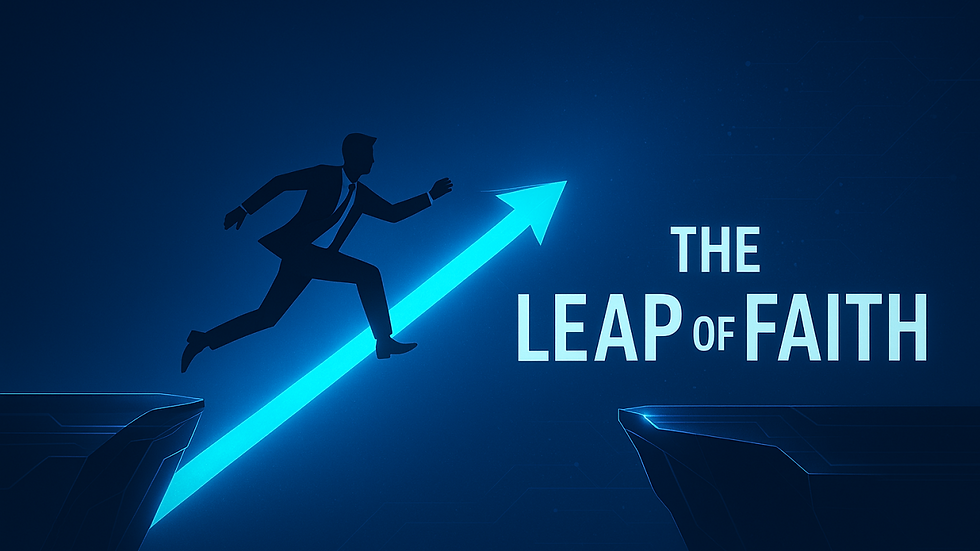The Urgent Need for 'Slow Wisdom' in the Age of AI Speed
- mouniryassine

- Oct 10
- 3 min read
The Wisdom Gap: Reconciling AI Speed with Human Purpose
The contemporary business landscape is defined by a fundamental tension rooted in human nature. Our biological system for perceiving the world—the ability to Sense immediate danger or opportunity—operates at a blistering pace, processing information at an estimated rate of one billion bits per second. This is our inherent, lightning-fast alarm system.
Yet, the mechanism responsible for true Wisdom—for conscious, ethical decision-making, complex problem-solving, and long-term strategic thought—is drastically slower. It filters this sensory flood down to a painstaking 10 bits per second for deliberate choice. This deliberative speed isn't a limitation; it is the necessary friction required for separating crucial long-term purpose from short-term urgency.
The Great Cognitive Divide: 1 Billion Bits vs. 10 Bits
Our base reality is a paradox of processing power. Our sensory system is an ultra-high-speed scanner, capable of taking in an avalanche of data—estimated at over a billion bits per second. This is the Sense—the instant recognition of a market shift, a security threat, or a consumer trend.
Yet, when that data hits the Conscious Mind—the seat of complex problem-solving, ethical review, and long-term planning—the speed drops to a trickle: perhaps 10 bits per second. This "slowness" is not a design flaw; it is the necessary friction required for deep analysis, for separating the urgent noise from the essential truth.
Now, consider Artificial Intelligence (AI). AI operates entirely in the domain of the billion-bits-per-second, digital universe. It is an extraordinary engine of execution and velocity. Its strength is the amplification of any input it receives. This creates our ultimate business challenge:
How do we ensure our slow, wise, 10-bit input directs the overwhelming speed of our billion-bit AI tools?
The next frontier of competitive advantage won't be in faster processing, but in deeper understanding. AI manages the data; Emotional Intelligence manages the people, the context, and the long-term relationships that truly drive value.
From 'Fast Profits' to 'Sustainable Foundation'
The danger in business is defaulting to the easiest metric: short-term, maximized, and narrow profit. When we guide AI with this single, fast-track goal, we are, in effect, instructing a super-computer to amplify our "Non-Sense."
To embed Slow Wisdom into Fast AI, we must change the foundational code of our decision-making.
This is where the principles of Sustainability and the framework of the Sustainable Development Goals (SDGs) move from an optional social project to a core strategic imperative.
The Ethical Filter: The SDGs—focused on People, Planet, and Prosperity—force a systems-thinking lens. They require leaders to consider the second-, third-, and fourth-order consequences of their actions. This process is inherently slow and deliberate and acts as the crucial ethical filter before the data is fed to the AI.
The Quality of Input: AI is a reflection engine; it learns from what we give it. If we build models on datasets driven solely by short-term metrics (e.g., maximize clicks, ignore supply chain labor risks), the resulting AI will simply supercharge the flaw. By prioritizing sustainability metrics—long-term value, community impact, resource efficiency—we ensure the AI is learning from a dataset rooted in resilient, trustworthy, and long-term value.
For a business, investing in this ethical groundwork is not about charity; it is about building an AI tool that is inherently more robust—one built to solve real-world, complex problems, not just maximize a narrow, self-serving variable.
Ignoring the social factor in a digital strategy is like launching a rocket without a guidance system. Sustainable business success is never a solo technical feat; it’s a collaborative human process powered by empathy, active listening, and collective purpose.
Leadership in the Age of Amplification
Every leader must recognize that deploying AI is not merely a technological upgrade; it is an act of accelerated consequence. The "non-sense" we deploy today will be amplified and calcified into our future technological systems, making harmful or biased outcomes exponentially harder to undo. We are essentially passing on our cognitive flaws to future generations through high-speed, self-learning systems.
Emotional intelligence isn't a 'soft skill'—it's the hard currency of leadership in the AI age. It’s what prevents technology from amplifying our biases and ensures our innovations create social value, not just shareholder return.
The question facing every executive is a simple, yet profound, ethical challenge:
Are we using our best, most thoughtful, and most ethical thinking to guide this super-fast technology?
True Business Consulting in the AI era is less about advising on which model to use and more about insisting on the quality of the human intention behind it. Our ability to sense what is truly important—to tap into that slow, wise, 10-bit deliberation—is the only thing that can ensure AI uses its overwhelming speed to build a better world, not merely expedite a flawed one.
Let's commit to "Slow Wisdom" as the governing principle of our Fast AI.
Our legacy depends on it.



Comments